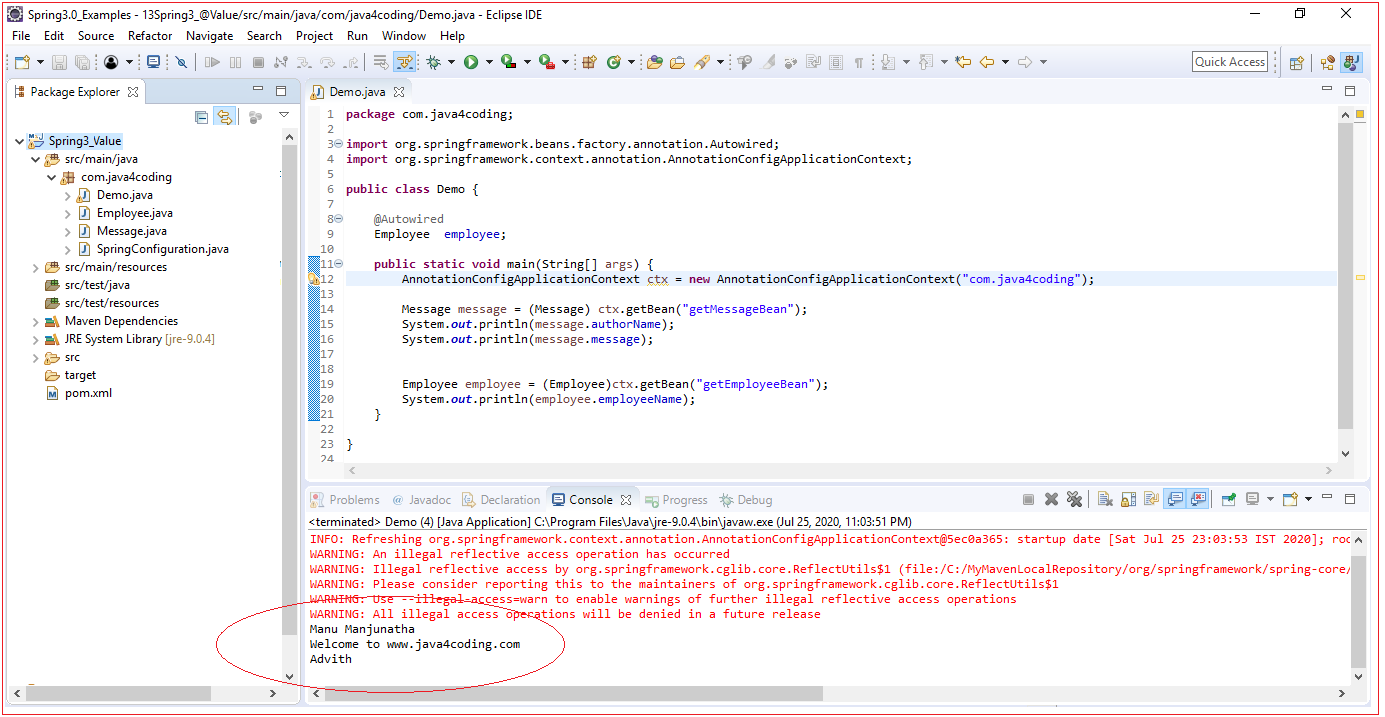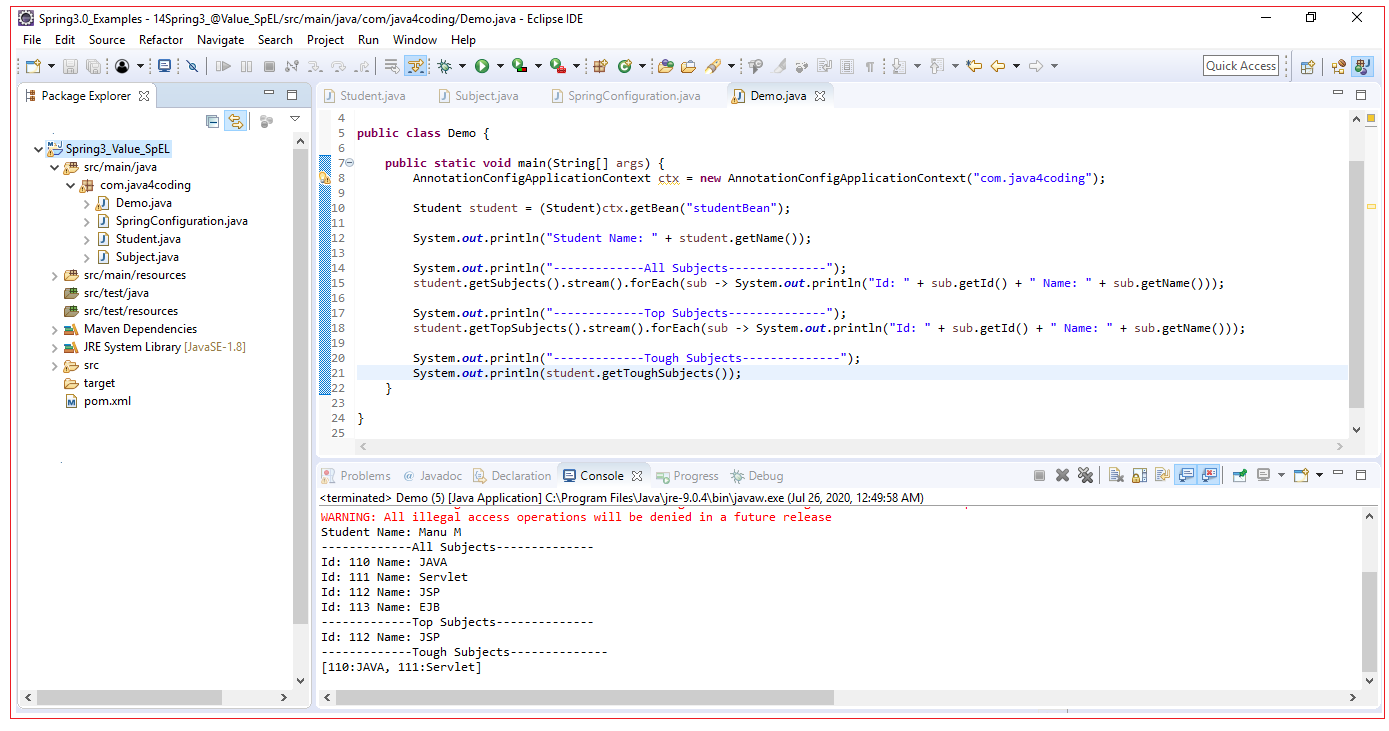| ☰ See All Chapters |
Spring @Value Annotation
@Value annotation can be used for injecting default values. This can be used at field level, parameters level of constructor and method. However the class where we used @Value annotation should be spring managed bean. We can inject values from properties files, in our next chapter Spring @PropertySource Annotation we learn to inject values from properties files. Also we can inject values through SpEL (Spring Expression Language), means @Value annotation supports SpEL to compute the values.
Let us see an example for how we can use @Value annotation to inject default value. Followed by this example we have given another example which shows how we can use SpEL to inject values.
Spring @Value Annotation Example
pom.xml
<project xmlns="https://maven.apache.org/POM/4.0.0" xmlns:xsi="https://www.w3.org/2001/XMLSchema-instance" xsi:schemaLocation="https://maven.apache.org/POM/4.0.0 https://maven.apache.org/xsd/maven-4.0.0.xsd"> <modelVersion>4.0.0</modelVersion> <groupId>com.java4coding</groupId> <artifactId>Spring3_Value</artifactId> <version>0.0.1-SNAPSHOT</version>
<dependencies> <dependency> <groupId>org.springframework</groupId> <artifactId>spring-core</artifactId> <version>${spring.version}</version> </dependency> <dependency> <groupId>org.springframework</groupId> <artifactId>spring-context</artifactId> <version>${spring.version}</version> </dependency> <dependency> <groupId>org.springframework</groupId> <artifactId>spring-aspects</artifactId> <version>${spring.version}</version> </dependency> </dependencies>
<properties> <spring.version>4.2.4.RELEASE</spring.version> </properties>
</project> |
Message.java
package com.java4coding;
import org.springframework.beans.factory.annotation.Value;
public class Message {
public String message;
@Value("Manu Manjunatha") public String authorName;
} |
Employee.java
package com.java4coding;
import org.springframework.beans.factory.annotation.Autowired; import org.springframework.beans.factory.annotation.Value; import org.springframework.stereotype.Component;
@Component public class Employee {
public String employeeName;
//constructor should be annotated with @Autowired, otherwise we get BeanCreationException as we don't have default constructor @Autowired public Employee(@Value("Advith")String employeeName) { this.employeeName = employeeName; } } |
SpringConfiguration.java
package com.java4coding;
import org.springframework.beans.factory.annotation.Autowired; import org.springframework.beans.factory.annotation.Value; import org.springframework.context.annotation.Bean; import org.springframework.context.annotation.Configuration;
@Configuration public class SpringConfiguration {
@Autowired Employee employee;
@Bean public Message getMessageBean(@Value("Welcome to www.java4coding.com")String message) { Message messageObj = new Message(); messageObj.message = message; return messageObj; }
@Bean public Employee getEmployeeBean () { return employee; } } |
Demo.java
package com.java4coding;
import org.springframework.beans.factory.annotation.Autowired; import org.springframework.context.annotation.AnnotationConfigApplicationContext;
public class Demo { @Autowired Employee employee;
public static void main(String[] args) { AnnotationConfigApplicationContext ctx = new AnnotationConfigApplicationContext("com.java4coding");
Message message = (Message) ctx.getBean("getMessageBean"); System.out.println(message.authorName); System.out.println(message.message);
Employee employee = (Employee)ctx.getBean("getEmployeeBean"); System.out.println(employee.employeeName); }
} |
Output

Spring @Value Annotation SpEL Example
@Value annotation also supports SpEL, below is an example on how to use SpEL with @Value annotation.
pom.xml
<project xmlns="https://maven.apache.org/POM/4.0.0" xmlns:xsi="https://www.w3.org/2001/XMLSchema-instance" xsi:schemaLocation="https://maven.apache.org/POM/4.0.0 https://maven.apache.org/xsd/maven-4.0.0.xsd"> <modelVersion>4.0.0</modelVersion> <groupId>com.java4coding</groupId> <artifactId>Spring3_Value</artifactId> <version>0.0.1-SNAPSHOT</version>
<dependencies> <dependency> <groupId>org.springframework</groupId> <artifactId>spring-core</artifactId> <version>${spring.version}</version> </dependency> <dependency> <groupId>org.springframework</groupId> <artifactId>spring-context</artifactId> <version>${spring.version}</version> </dependency> <dependency> <groupId>org.springframework</groupId> <artifactId>spring-aspects</artifactId> <version>${spring.version}</version> </dependency> </dependencies>
<properties> <spring.version>4.2.4.RELEASE</spring.version> </properties>
</project> |
Subject.java
package com.java4coding;
public class Subject { private String name; private int id;
public Subject() { }
public Subject(String name, int id ) { this.name = name; this.id = id; }
public String getName() { return name; }
public void setName(String name) { this.name = name; }
public int getId() { return id; }
public void setId(int id) { this.id = id; } } |
Student.java
package com.java4coding;
import java.util.List;
public class Student { private String name; private List<Subject> subjects; private List<Subject> topSubjects; private List<String> toughSubjects;
public String getName() { return name; }
public void setName(String name) { this.name = name; }
public List<Subject> getSubjects() { return subjects; }
public void setSubjects(List<Subject> subjects) { this.subjects = subjects; }
public List<Subject> getTopSubjects() { return topSubjects; }
public void setTopSubjects(List<Subject> topSubjects) { this.topSubjects = topSubjects; }
public List<String> getToughSubjects() { return toughSubjects; }
public void setToughSubjects(List<String> toughSubjects) { this.toughSubjects = toughSubjects; } } |
SpringConfiguration.java
package com.java4coding;
import java.util.ArrayList; import java.util.List;
import org.springframework.beans.factory.annotation.Value; import org.springframework.context.annotation.Bean; import org.springframework.context.annotation.Configuration;
@Configuration public class SpringConfiguration {
@Bean public List<Subject> subjectList() { List<Subject> list = new ArrayList<Subject>(); list.add(new Subject("JAVA", 110)); list.add(new Subject("Servlet", 111)); list.add(new Subject("JSP", 112)); list.add(new Subject("EJB", 113)); return list; }
@Value("#{'Manu M'}") private String name;
@Value("#{subjectList}") private List<Subject> subjects;
@Value("#{subjectList.?[id gt 111 and id lt 113]}") private List<Subject> topSubjects;
@Value("#{subjectList.?[id le 111].![id+':'+name]}") private List<String> toughSubjects;
@Bean public Student studentBean ( ) { Student student = new Student(); student.setName(name); student.setSubjects(subjects); student.setTopSubjects(topSubjects); student.setToughSubjects(toughSubjects); return student; } } |
Demo.java
package com.java4coding;
import org.springframework.context.annotation.AnnotationConfigApplicationContext;
public class Demo {
public static void main(String[] args) { AnnotationConfigApplicationContext ctx = new AnnotationConfigApplicationContext("com.java4coding");
Student student = (Student)ctx.getBean("studentBean");
System.out.println("Student Name: " + student.getName());
System.out.println("-------------All Subjects--------------"); student.getSubjects().stream().forEach(sub -> System.out.println("Id: " + sub.getId() + " Name: " + sub.getName()));
System.out.println("-------------Top Subjects--------------"); student.getTopSubjects().stream().forEach(sub -> System.out.println("Id: " + sub.getId() + " Name: " + sub.getName()));
System.out.println("-------------Tough Subjects--------------"); System.out.println(student.getToughSubjects()); } } |
Output

All Chapters

